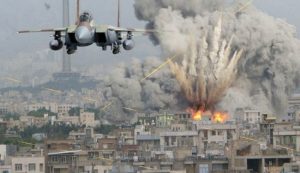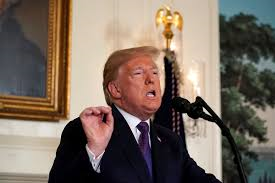 The United States, Britain and France have attacked the chemical weapon sites in Syria in response to the chemical attack reportedly launched by the loyalist forces of President Bashar al-Assad’s regime on Eastern Ghouta in the Douma region.
The United States, Britain and France have attacked the chemical weapon sites in Syria in response to the chemical attack reportedly launched by the loyalist forces of President Bashar al-Assad’s regime on Eastern Ghouta in the Douma region.
In a televised address, US President Donald Trump said that the three nations had “marshaled their righteous power against barbarism and brutality” which has claimed almost 1,700 civilian lives in Douma. The chemical weapons attack reportedly took place on April 7, 2018.
The strike was announced on April 13 by Mr Trump in Washington DC, followed by British Prime Minister Theresa May minutes later. As per their statements, three sites connected with chemical weapon use was targeted, including one scientific facility near Damascus and two storage facilities near Homs.
The naval and air forces units of the three countries were involved in the strike, involved more than a hundred missiles and lasted for not less than 70 minutes.
Russia warns of consequences
The Syrian government has repeatedly denied the use of chemical weapons. In a statement, Syria’s permanent representative to the UN, Bashar al-Jaafari accused the Western powers of fabricating the report “to prepare the ground for an aggression against my country, just as the United States and the United Kingdom did in Iraq in 2003.”
The strikes elicited a sharp response from Moscow, a long-time ally of Assad. Russian Foreign Minister Sergei Lavrov said that it had “irrefutable evidence that this was yet another attack, staged with the participation of special services of one state that is striving to be at the forefront of the Russophobic campaign”.
The three countries, however, repudiated any agenda and contended that the strike was neither about intervening in the Syria not about regime change, but was a fitting response heinous chemical attack by Assad’s loyal forces. “The purpose of our actions tonight is to establish a strong deterrent against the production, spread and use of chemical weapons. Establishing this deterrent is a vital national security interest of the United States,” said the US president.
Ms May justified Britain’s involvement and argued strongly that there was “no practicable alternative to the use of force”. She described this strike as a “limited and targeted strike that does not further escalate in the region and that does everything possible to prevent civilian casualties”.
French President Emmanuel Macron justified use of force, saying that the “red line has been crossed” with the death of “dozens of men, women and children were massacred with chemical weapons,” he said.
West rallies in support
The latest strikes on Syria garnered support from many Western countries, including Australia and Canada. Australian Prime Minister Malcolm Turnbull said Australia supported the strikes, which demonstrated a “calibrated, proportionate and targeted response”. “The use of chemical weapons by anyone, anywhere, under any circumstances is illegal and utterly reprehensible,” Mr Turnbull said.
NATO Secretary General Jen Stoltenberg, tweeted support for the strikes, saying those who use chemical weapons “must be held accountable”.
Canadian Prime Minister Justin Trudeau also expressed support for the airstrikes.
What’s next?
The three-nation strike on Syria could unleash a dangerous crisis for the region, with Russia warning of “consequences” and President Valdimir Putin condemning the attacks.
The Assad regime has struck a defiant note. SANA, Syria’s official state news agency, called the Western action “a flagrant violation of international law”.
“The American, French and British aggression against Syria will fail,” it said.
The Syrian opposition has, however, described the air strikes as a cautionary call that will deter the Syrian regime from using chemical weapons.
In a tweet, Syrian opposition leader Nasra al-Hariri called for an end to what he described as all attacks against civilians by the Syrian state and its allies, whether using chemical or conventional weapons.
“Maybe the regime will not use chemical weapons again, but it will not hesitate to use weapons the international community has allowed it, such as barrel bombs and cluster bombs,” Mr Hariri said.
 In the midst of a volatile situation, UN Secretary-General Antonio Guterres has urged the countries to show restraint in these dangerous circumstances. “I have repeatedly expressed my deep disappointment that the Security Council failed to agree on a dedicated mechanism for effective accountability for the use of chemical weapons in Syria,” said Mr Guterres.
In the midst of a volatile situation, UN Secretary-General Antonio Guterres has urged the countries to show restraint in these dangerous circumstances. “I have repeatedly expressed my deep disappointment that the Security Council failed to agree on a dedicated mechanism for effective accountability for the use of chemical weapons in Syria,” said Mr Guterres.
The strikes are over for now, but going by what President Trump says more such retaliatory steps can’t be ruled out. “We are prepared to sustain this response until the Syrian regime stops its use of prohibited chemical agents,” said Mr Trump in his televised address.
Author Profile
- India Writes Network (www.indiawrites.org) is an emerging think tank and a media-publishing company focused on international affairs & the India Story. Centre for Global India Insights is the research arm of India Writes Network. To subscribe to India and the World, write to editor@indiawrites.org. A venture of TGII Media Private Limited, a leading media, publishing and consultancy company, IWN has carved a niche for balanced and exhaustive reporting and analysis of international affairs. Eminent personalities, politicians, diplomats, authors, strategy gurus and news-makers have contributed to India Writes Network, as also “India and the World,” a magazine focused on global affairs.
Latest entries
 DiplomacyJanuary 5, 2026India walks diplomatic tightrope over US operation in Venezuela
DiplomacyJanuary 5, 2026India walks diplomatic tightrope over US operation in Venezuela India and the WorldNovember 26, 2025G20@20: Africa’s Moment – The Once and Future World Order
India and the WorldNovember 26, 2025G20@20: Africa’s Moment – The Once and Future World Order DiplomacyOctober 4, 2025UNGA Resolution 2758 Must Not Be Distorted, One-China Principle Brooks No Challenge
DiplomacyOctober 4, 2025UNGA Resolution 2758 Must Not Be Distorted, One-China Principle Brooks No Challenge India and the WorldJuly 26, 2025MPs, diplomats laud Operation Sindoor, call for national unity to combat Pakistan-sponsored terror
India and the WorldJuly 26, 2025MPs, diplomats laud Operation Sindoor, call for national unity to combat Pakistan-sponsored terror







